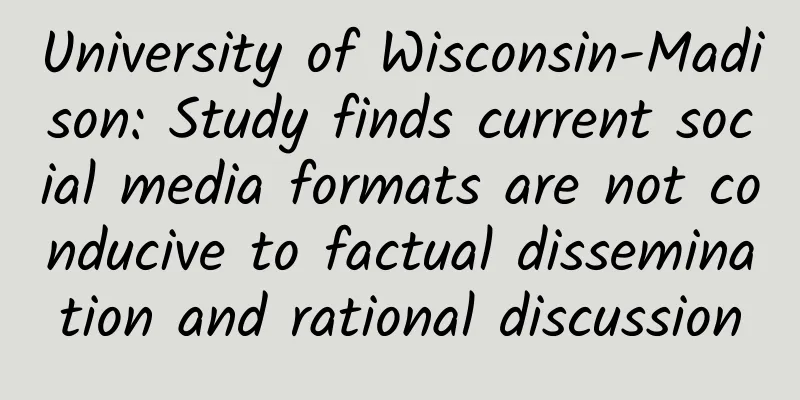University of Wisconsin-Madison: Study finds current social media formats are not conducive to factual dissemination and rational discussion

|
A special group of editorials published in the journal Science on Thursday said that the current form of social media may fundamentally undermine the dissemination and presentation of factual reasons. The researchers pointed out that social media is being dominated by algorithms, and the system's priorities are unfortunately backwards. Dominique Brossard and Dietram Scheufele from the University of Wisconsin-Madison write in this short and sweet article:
Obviously, this is a matter of great concern to researchers who uphold scientific methodology. Among the many factors that have a negative impact on scientific discussions on social media, ranking and recommendation engines are at the forefront. This results in what Brossard and Schefele call “homogeneous self-categorization,” meaning that platforms will focus on user preferences to recommend relevant content, leading to an increasingly pronounced clustering effect.
The reason is that there has been a structural shift in the balance of power in the scientific information ecosystem. Social media platforms and their underlying algorithms are only concerned with attracting traffic and driving rapid growth in platform size. To this end, companies will allow users’ emotional and cognitive weaknesses to be exploited. So we are not surprised that this happens. H. Holden Thorp, editor-in-chief of the Science journal series, put it succinctly - after all, this is a great way for companies like Facebook to make huge profits. |
<<: IDC: China's smartphone market shipments fell 11.8% year-on-year in Q1 2023
>>: Crazy Stones: Bile Duct Stones That Are Different!
Recommend
If you don’t eat spring bamboo shoots, how can you know the feeling of spring? Here is just one reason to persuade you to eat more spring bamboo shoots!
Pickled bamboo shoots with preserved vegetables, ...
What medicine to take during menopause
Many women will suffer from insomnia after enteri...
What causes breast pain during delayed menstruation?
Menstruation is a physiological phenomenon of wom...
How to deal with this skin disease that sounds like a plant name?
Urticaria, a disease name that sounds like a plan...
What should I do if my neck itches during pregnancy?
Neck itching is mostly a skin disease and has lit...
Twin sisters always fall down when walking, it turns out they have congenital cataracts
During the physical examination at the kindergart...
Is there any scientific reason behind the saying “Drinking water in big gulps is the same as not drinking it at all”?
Have you ever heard of the view that "drinki...
What is a neurophysiological test?
Author: Zhao Yanan, The First Affiliated Hospital...
Can I eat watermelon after having an abortion?
Watermelon is a fruit that everyone is familiar w...
Headache during menstruation
During menstruation, women’s bodies will become w...
199IT integrates more than 400 articles on various Facebook data collections
[199IT integrates more than 400 articles on vario...
How many of the 10 symptoms of sub-health do you have? How should young people manage their health?
...
Girls' private parts have pimples
The appearance of fleshy bumps on women's gen...
University at Albany: Study shows addictive social behaviors may lead to drug addiction
Psychologists at the University at Albany have fo...
Is it painful to artificially break the water before the digit is opened?
The biggest worry for pregnant women during pregn...









